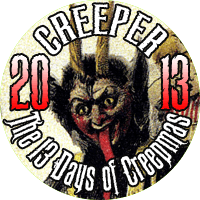 I love Texas Chainsaw Massacre 2. LOVE it! That puts me in the minority. A lot of people hate Texas Chainsaw Massacre 2. None other than the imminent Roger Ebert, legendary movie critic and hater of all that is awesome in the horror genre, gave it a one star review back in 1986, saying “it doesn't have the terror of the original, the desire to be taken seriously. It's a geek show.” Why did so many people review it so harshly in 1986, and why do so many people hate on it now? It’s because they didn’t get it. They didn’t recognize the brilliance of Tobe Hooper’s approach to the sequel. They all wanted more of the same. Tobe Hooper was smart enough to know that he had captured lightning in a bottle. The perfect storm of the people, time, place, and situation had created a magic that could not be replicated. Therefore he decided to keep the features that marked it as a TCM movie, and shift the tone to do something completely different. He couldn’t match the terror, so why not go for a satire? Why not keep the trappings of a horror flick, but have a little fun with it? Audiences have never reacted well when a franchise lightens its tone, with maybe the exception of Bride of Chucky. I see that confused look on your faces. You’re asking why the hell I’m going on about Texas Chainsaw Massacre 2 when I’m supposed to be reviewing The Wicker Tree. Well, it’s because The Wicker Tree is getting a cold response from reviewers and viewers alike, and it’s for the exact same reason, they can’t handle that it’s a different type of movie than its classic predecessor.
I love Texas Chainsaw Massacre 2. LOVE it! That puts me in the minority. A lot of people hate Texas Chainsaw Massacre 2. None other than the imminent Roger Ebert, legendary movie critic and hater of all that is awesome in the horror genre, gave it a one star review back in 1986, saying “it doesn't have the terror of the original, the desire to be taken seriously. It's a geek show.” Why did so many people review it so harshly in 1986, and why do so many people hate on it now? It’s because they didn’t get it. They didn’t recognize the brilliance of Tobe Hooper’s approach to the sequel. They all wanted more of the same. Tobe Hooper was smart enough to know that he had captured lightning in a bottle. The perfect storm of the people, time, place, and situation had created a magic that could not be replicated. Therefore he decided to keep the features that marked it as a TCM movie, and shift the tone to do something completely different. He couldn’t match the terror, so why not go for a satire? Why not keep the trappings of a horror flick, but have a little fun with it? Audiences have never reacted well when a franchise lightens its tone, with maybe the exception of Bride of Chucky. I see that confused look on your faces. You’re asking why the hell I’m going on about Texas Chainsaw Massacre 2 when I’m supposed to be reviewing The Wicker Tree. Well, it’s because The Wicker Tree is getting a cold response from reviewers and viewers alike, and it’s for the exact same reason, they can’t handle that it’s a different type of movie than its classic predecessor.
Of course it’s inevitable that The Wicker Tree will draw comparisons to The Wicker Man. Everyone loves The Wicker Man. Hell, even elitist film snobs who turn up their noses at horror movies dig that one. The comparison is especially strong considering that writer/director Robin Hardy has returned for this follow up. Like Hooper, Hardy realized that it just wasn’t quite possible to make that same magic again almost 40 years later, so he didn’t try. One of the major reasons is the fact that neo-paganism has become so mainstream since “Man” was released that only the most ridiculously pious still find it threatening. It would have been foolish to try conjuring up the same cinematic experience, and he smartly took it in a different direction. It follows the same basic storyline, but with notable differences. This time a young couple from Texas; a country starlet turned bible thumping gospel singer and her cowpoke fiancé, go to Scotland to spread the gospel. Their message does not exactly receive a warm welcome from the locals, but they themselves do; being invited to be the “May Queen” and “Laddie” in their May Day celebration. They see it as a chance to connect with the locals and spread the word of God. The villagers have other ideas.
 Where it differs is in the overall tone of the film. In the first film, our “hero” arrives in a village, which is subtly bizarre in its pagan ways. The uneasy feeling and psychological tension build and build as we wonder exactly what is going on in this place. The screw tightens and tightens all the way up to the iconic conclusion. It’s a pretty safe assumption that if you’re enough of a horror fan to watch The Wicker Tree then you’re enough of a horror fan to have seen The Wicker Man, so you already know the endgame here. From the moment our couple arrives, we know that they’re doomed. In this way it’s not a psychological horror flick built around suspense like the first one. It’s actually structured more like a slasher movie in that we already know where this is heading, the point is to revel in how we get our victims there.
Where it differs is in the overall tone of the film. In the first film, our “hero” arrives in a village, which is subtly bizarre in its pagan ways. The uneasy feeling and psychological tension build and build as we wonder exactly what is going on in this place. The screw tightens and tightens all the way up to the iconic conclusion. It’s a pretty safe assumption that if you’re enough of a horror fan to watch The Wicker Tree then you’re enough of a horror fan to have seen The Wicker Man, so you already know the endgame here. From the moment our couple arrives, we know that they’re doomed. In this way it’s not a psychological horror flick built around suspense like the first one. It’s actually structured more like a slasher movie in that we already know where this is heading, the point is to revel in how we get our victims there.
One of the effects of this shift in dramatic structure is the different role of the “heroes.” In “Man” the sergeant is a tragic character. He is a good man, and is just as devout in his beliefs as the pagan villagers are in theirs. We respect him even though we might not agree with him. Following his demise is harrowing. In “Tree,” the missionary couple is so unlikable and obnoxious that we’re rooting for them to die. They are a broad caricature of fundamentalist Christianity. They are condescending without even knowing it, not overly bright, abrasive, condescending, and laughably naïve. Instead of being an indictment of religion in general like “Man,” this one is less ambiguous as to who are the “good guys” and who are the “bad guys.” Sure, the pagans are murderers, but they’re infinitely more likable than the Christians. Steve, the cowboy, is a little more likable than Beth, but they both have little redeeming value. One thing I will say for the characters, they’re realistic. Being a preachers kid, I’ve seen 2 kinds of Christians. There are the believers who know why they believe. More power to them. Then there are the brainwashed god-zombies who just regurgitate dogma. Beth and Steve were EXACTLY like these folks are in real life. They were both written very accurately by Hardy and played just as accurately by Brittania Nicol and Henry Garrett. I may be a little biased there, but I couldn’t wait for them to get what was coming to them.
 One aspect of the flick that I couldn’t really get behind was its villain. Graham McTavish plays Sir Lachlan Morrison, the leader of the town and head of a local nuclear power plant. McTavish is certainly no Christopher Lee, who the role was originally written for, but he does a good enough job. Speaking of Christopher Lee, I know this movie virtually couldn’t have been done without an appearance by His Lordship, but the way they got that cameo in there sure felt forced. Anyway, my issue isn’t with the performance, but the character himself. Lord Summerisle was a subtle, chilling menace whose “evilness” could be debated. Sir Morrison, on the other hand, I almost expected to don a cape and top hat before tying Beth to some train tracks. He even, at one point, says that he’s “like Monty Burns from The Simpsons.” IN THOSE WORDS! That’s about as subtle as a kick in the balls. While the cartoonish evilness of Morrison and his female counterpart provide for a couple of entertaining moments, it’s one aspect of the story that I think would have worked better with a less ham fisted approach. Speaking of ham fisted, the “losing the purity ring” bit was contrived as hell.
One aspect of the flick that I couldn’t really get behind was its villain. Graham McTavish plays Sir Lachlan Morrison, the leader of the town and head of a local nuclear power plant. McTavish is certainly no Christopher Lee, who the role was originally written for, but he does a good enough job. Speaking of Christopher Lee, I know this movie virtually couldn’t have been done without an appearance by His Lordship, but the way they got that cameo in there sure felt forced. Anyway, my issue isn’t with the performance, but the character himself. Lord Summerisle was a subtle, chilling menace whose “evilness” could be debated. Sir Morrison, on the other hand, I almost expected to don a cape and top hat before tying Beth to some train tracks. He even, at one point, says that he’s “like Monty Burns from The Simpsons.” IN THOSE WORDS! That’s about as subtle as a kick in the balls. While the cartoonish evilness of Morrison and his female counterpart provide for a couple of entertaining moments, it’s one aspect of the story that I think would have worked better with a less ham fisted approach. Speaking of ham fisted, the “losing the purity ring” bit was contrived as hell.
I’ve called The Wicker Tree out on a couple of things, but make no mistake; I enjoyed this one. It has a lot going for it. I really want the soundtrack. Yes, I’d have to skip past a few god awful country ditties, but the score is wonderful and there are some excellent folk songs that we got a taste of in the flick that I would like to hear complete versions of. As far as acting goes, the best performance was definitely by Honeysuckle Weeks as Lolly. Damn she was good. This is the first time I’ve seen her, and I must say that if she’s always this good, the British beauty has a bright future ahead of her. A lot of the townsfolk are great in their small but memorable parts. The scenery is absolutely gorgeous. There are some good one-liners strewn about. The final moment of the film is as stereotypically “Brit Horror” as it gets, and that’s definitely not a bad thing. It was like a band covering a well-known song at the end of their set and leaving the audience with a smile.
It’s going to be tough to talk about my favorite moment in the flick without spoiling major plot points. Lets see if I can do it. Growing up Southern Baptist, I am very familiar with the hymn “Power in the Blood.” There’s a point where the villagers play along when our hapless but well meaning duo lead the villagers in a singalong of that particular hymn. Being such a familiar song to me, I caught a little bit of a foreboding feeling from the way they looked at each other during the song, but I didn’t fully realize what was coming. There is a major scene near the film’s climax when that song is turned on its ear, and the effect is absolutely brilliant. It’s kinda chilling actually. I’m not sure if it would play with as much impact to those who didn’t grow up with the song, but I was absolutely blown away. It literally gave me goosebumps in that “holy hell, this scene is amazing” way.
 I started out this review drawing a parallel between The Wicker Tree and Texas Chainsaw Massacre 2. This is not to say that this film reaches the level of brilliance that TCM 2 does. TCM 2 is on my top ten of all time, whereas it will have to be a slow year for this to make my top 10 of 2012. What I was saying is that, like TCM 2, you probably won’t dig it if you’re expecting it to live up to its precursor. If you recognize it as a completely different animal and judge it on its own merits, you’ll find a very enjoyable flick. It’s much better than its icy reception from the critics would have you believe. It’s like a pizza with weird toppings; familiar enough to be comfort food but different enough to provide a fresh experience. Ok, it’s time to wrap this up before these comparisons get any more ridiculous. One severed thumb up. Nathan says check it out.
I started out this review drawing a parallel between The Wicker Tree and Texas Chainsaw Massacre 2. This is not to say that this film reaches the level of brilliance that TCM 2 does. TCM 2 is on my top ten of all time, whereas it will have to be a slow year for this to make my top 10 of 2012. What I was saying is that, like TCM 2, you probably won’t dig it if you’re expecting it to live up to its precursor. If you recognize it as a completely different animal and judge it on its own merits, you’ll find a very enjoyable flick. It’s much better than its icy reception from the critics would have you believe. It’s like a pizza with weird toppings; familiar enough to be comfort food but different enough to provide a fresh experience. Ok, it’s time to wrap this up before these comparisons get any more ridiculous. One severed thumb up. Nathan says check it out.








1 comment:
religion can screw up people, no matter what they believe in.
Yeah, the town people were nice, but they were also driven crazy by religion, to the point where they would kill.
And about TEXAS CHAINSAW 2, I LOVE THAT FREAKING MOVIE! It's awesome in a whole different way than the first. It's great for different reasons, which is what I hope will happen with The Wicker Tree.
Post a Comment